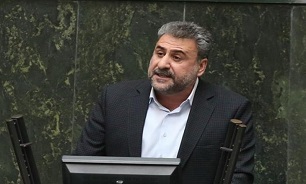Europe Should Not Be Allowed to Interfere in Iran’s Internal Affairs: MP
 Heshmatollah Falahat Pishe slammed the EU’s recent statement about the financial mechanism for trade with Iran, known as the Instrument in Support of Trade Exchanges (INSTEX), in which the bloc criticized the Islamic Republic’s ballistic missile tests.
Heshmatollah Falahat Pishe slammed the EU’s recent statement about the financial mechanism for trade with Iran, known as the Instrument in Support of Trade Exchanges (INSTEX), in which the bloc criticized the Islamic Republic’s ballistic missile tests.
In eight clauses of the statement on the INSTEX, the Europeans have raised “empty claims” about Iran's missile program, the lawmaker deplored.
“We should not allow them to interfere in Iran's internal affairs, including its missile and defense program,” he went on to say.
Iranian officials have repeatedly underscored that the country will not hesitate to strengthen its military capabilities, including its missile power, which are entirely meant for defense, and that Iran’s defense capabilities will be never subject to negotiations.
Last week, Britain, France and Germany issued a joint statement on the creation of the INSTEX that will allow trade between the EU and Iran without relying on direct financial transactions.
On Monday, however, the Council of the European Union issued a conclusion on the Islamic Republic, urging Iran to “adopt and implement the necessary legislation pursuant to its commitments under the Financial Action Task Force (FATF) Action Plan.”
The EU has also voiced readiness to “continue cooperation with Iran in these areas, including by providing technical assistance for the implementation of the FATF Action Plan.”
Iranian Judiciary Chief Ayatollah Sadeq Amoli Larijani has stressed that the country would never accept the “humiliating conditions” of the European Union’s financial mechanism for trade with Iran, including Iran’s accession to FATF.
“The European countries have reportedly set two ‘strange conditions’ for the mechanism named INSTEX,” the top judge deplored, saying, “The countries should be aware that Iran will by no means accept these humiliating conditions and will not accede to any demand at the expense of opening a small waterway such as INSTEX.”
The European countries are reportedly going to use the channel initially only to sell food, medicine and medical devices in Iran.
The EU has vowed to counter US President Donald Trump’s renewed sanctions on Iran, including by means of a new law to shield European companies from punitive measures.
On May 8, the US president pulled his country out of the Joint Comprehensive Plan of Action (JCPOA), the nuclear deal that was achieved in Vienna in 2015 after years of negotiations among Iran and the Group 5+1 (Russia, China, the US, Britain, France and Germany).
Following the US exit, Iran and the remaining parties launched talks to save the accord.
Trump on August 6 signed an executive order re-imposing many sanctions on Iran, three months after pulling out of the Iran nuclear deal.
He said the US policy is to levy “maximum economic pressure” on the country.
The second batch of US sanctions against the Islamic Republic took effect on November 4.
Message end/
